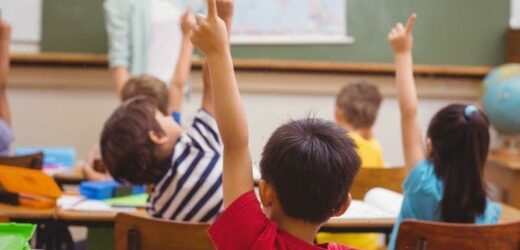Teachers and other school staff should receive priority access to COVID-19 vaccines. This is not just because they have close contact with many people every day but because vaccinating the schools workforce will make it easier to keep more children in school during outbreaks.
Every school day, about four million children head off to schools around the country, where they are taught by more than 290,000 teachers and supported by at least 130,000 staff in various administrative, support, and maintenance roles.
All teachers need to be vaccinated as a priority, as they have been in parts of NSW.Credit:Shutterstock
Add to that the parents and carers mingling at the school gate, and it’s no wonder schools have been a source of anxiety for public health officials grappling with COVID outbreaks in Australia and overseas.
Closing schools en masse may seem like an obvious call to make when outbreaks flare.
But school closures can cause serious harm to children and are likely to be especially harmful for those already disadvantaged. Grattan Institute research shows that during extended school closures many children will slip backwards in their learning. Many children also struggle with their emotional and mental health as routines and social connections are disrupted. We know from bitter experience last year that some children will permanently disengage from school if closures persist.
Closing schools can cause serious harm to some students and result in disengagement.Credit:Louie Douvis
One of the few silver linings of the current NSW outbreak is that it has strengthened calls for teachers and other school staff to get priority for COVID vaccines. The NSW Government’s decision to make teachers in Sydney’s worst affected areas eligible for the vaccine, regardless of their age, is a welcome first step. Now we need all governments to commit to vaccinating teachers and school staff as soon as possible.
Of course, being vaccinated would reduce the risk of teachers getting seriously ill. But even more importantly, vaccinating all teachers and school staff would help reduce the risk of them transmitting the virus to others at school, including their students. That could help allow a more nuanced approach to school closures in the future.
Overseas research shows that learning loss during extended school closures has been significant. The available data in Australia also paints a concerning picture. Initial indications from the NSW Government suggest students lost up to two to four months of learning because of school closures in that state in 2020 – and of course Victoria’s schools were closed for much longer.
Grattan Institute’s research suggests school closures have a much greater impact on disadvantaged and other vulnerable children. It suggests the learning gap between advantaged and disadvantaged children could grow three times faster when schools are closed.
In fact, disadvantaged children may be hit by a triple whammy. Many disadvantaged children already need more school support to keep on track. These children are also less likely to have reliable IT devices and an internet connection or a quiet place to study at home. On top of this, teachers in schools serving disadvantaged students were four times more likely to report that their school struggled to make the transition to online learning, according to a large Australian survey conducted by Pivot.
Other researchers have drawn attention to the significant social and emotional consequences of school closures for children and their families. In a major report published late last year, the Murdoch Children’s Research Institute highlighted the increased risks of children suffering mental health, behavioural, and developmental problems – and worse, an increased risk of children being abused or neglected. Still other research has highlighted increased loneliness, which can damage children’s mental health.
We should not kid ourselves: some of these harms may cast a long shadow over the future of our children.
Schools are an essential service. While closing schools may sometimes be unavoidable to get control of an outbreak, schools should only be closed as a last resort. Even then, more nuanced approaches may be possible, such as more limited school closures based on geographic area, permitting special schools to remain open and some primary and secondary year levels at mainstream schools to continue face-to-face teaching while others learn from home.
Vaccinating teachers and school staff would give governments greater confidence to consider these options during future outbreaks. And when the science shows that it is safe to do so, vaccinating children should be prioritised too.
Our leaders must act now, for the sake of our children.
Jordana Hunter is education program director at the Grattan Institute.
Most Viewed in Politics
From our partners
Source: Read Full Article




